| August 19, 2007 |  |
our time will build eternity |
| Previous Issues | Aug 18 | Aug 17 | Aug 16 | Aug 15 | Aug 14 |
Nuclear Power In Space Moscow, Russia (RIA Novosti) Aug 15, 2007
Moscow, Russia (RIA Novosti) Aug 15, 2007Solar energy supplies most of power in spacecraft nowadays. Although the efficiency of solar cells has grown substantially recently, they have reached the limit of their development and can supply electricity only in near-Earth orbits and for satellite-borne equipment. Such large-scale projects as the exploration of the Moon or a manned mission to Mars require nuclear power plants. ... more India Wants To Launch First Reusuable Space Launcher By 2010  Bangalore (RIA Novosti) Aug 15, 2007
Bangalore (RIA Novosti) Aug 15, 2007India is planning to launch a reusable spacecraft for the first time in 2010 and to send a mission to Mars as early as 2012, a senior space official said Monday. India has been successfully developing its space program in recent years, regularly launching satellites using its own booster rockets. "Our target [for the first launch] is before 2010," the Press Trust of India news agency quoted ... more New Clues To Early Sol  Toronto, Canada (SPX) Aug 14, 2007
Toronto, Canada (SPX) Aug 14, 2007A University of Toronto-led study has uncovered tiny zircon crystals in a meteorite originating from Vesta (a large asteroid between Mars and Jupiter), shedding light on the formation of planetesimals, small astronomical objects that form the basis of planets. To date, studying zircons in eucrites - meteorites formed by volcanic activity - has been difficult due to impact- induced fracturi ... more Keeping The Plates Of Planet Earth Well Oiled  Paris, France (ESF) Aug 14, 2007
Paris, France (ESF) Aug 14, 2007Earth's surface is a very active place; its plates are forever jiggling around, rearranging themselves into new configurations. Continents collide and mountains arise, oceans slide beneath continents and volcanoes spew. As far as we know Earth's restless surface is unique to the planets in our solar system. So what is it that keeps Earth's plates oiled and on the move? Scientists think tha ... more Phoenix Adjusts Course Successfully For Journey To Mars  Pasadena (SPX) Aug 12, 2007
Pasadena (SPX) Aug 12, 2007NASA has commanded the Phoenix Mars Lander to make the first and largest of six course corrections planned during the spacecraft's flight from Earth to Mars. Phoenix left Earth Aug. 4, bound for a challenging touchdown on May 25, 2008, at a site farther north than any previous Mars landing. It will robotically dig to underground ice and run laboratory tests assessing whether the site could ever ... more |
mars-general
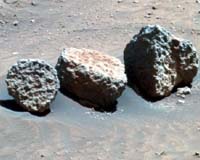 mars-phoenix 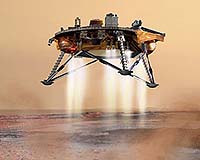 mars-mers 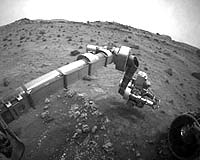 |
 Dallas TX (SPX) Aug 08, 2007
Dallas TX (SPX) Aug 08, 2007Dr. John H. Hoffman, a space scientist at The University of Texas at Dallas, was on hand Saturday as the Delta II rocket carrying the Phoenix Mars lander lifted off from Cape Canaveral Air Force Base for a 10-month long journey to the Red Planet. A physics professor and member of the University's William B. Hanson Center for Space Sciences, Hoffman is part of team of researchers lead by Dr. Pete ... more Crystals On Meteorite Reveal Clues To Early Solar System Evolution  Toronto, Ontario (SPX) Aug 07, 2007
Toronto, Ontario (SPX) Aug 07, 2007A University of Toronto-led study has uncovered tiny zircon crystals in a meteorite originating from Vesta (a large asteroid between Mars and Jupiter) shedding light on the formation of planetesimals, small astronomical objects that form the basis of planets. To date, studying zircons in eucrites - meteorites formed by volcanic activity - has been difficult due to impact- induced fracturing and ... more NASA Sends Robotic Lander In Search Of Water And Life On Mars  Washington (AFP) Aug 04, 2007
Washington (AFP) Aug 04, 2007A US space probe embarked Saturday on a 10 month journey to Mars, where it will dig through Martian soil in a search for signs of life in a frigid region of the Red Planet. The Phoenix Mars Lander separated from a Delta II rocket after blasting off into the dark sky at 5:36 am (0936 GMT) from the Kennedy Space Center in Cape Canaveral, Florida. Powered by solar panels, Phoenix, whose launch was ... more Extreme Analytical Chemistry Will Help Unravel Mars Mysteries  Somerville MA (SPX) Aug 05, 2007
Somerville MA (SPX) Aug 05, 2007Sam Kounaves spends his time unraveling fundamental questions in planetary science by applying "extreme analytical chemistry" to the harshest environments imaginable: Places like Death Valley, Antarctica - and now Mars. The Tufts professor is a co-investigator on NASA's Phoenix Mars Lander Mission currently scheduled for launch on August 4. Kounaves will be leading the chemical analysis of Marti ... more |
mars-phoenix
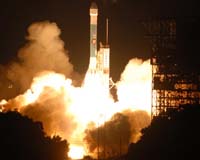 mars-phoenix  mars-phoenix  |
 Pasadena CA (JPL) Aug 02, 2007
Pasadena CA (JPL) Aug 02, 2007Rover engineers are growing increasingly concerned about the temperature of vital electronics on NASA's Mars Exploration Rover Opportunity while the rover stays nearly inactive due to a series of dust storms that has lasted for more than a month. Dust in the atmosphere and dust settling onto Opportunity's solar panels challenges the ability of the solar panels to convert sunlight into enough ele ... more Interplanetary Networking As Mars Express Prepares To Keep An Eye On Phoenix  Paris, France (ESA) Aug 02, 2007
Paris, France (ESA) Aug 02, 2007ESA's Mars Express will keep an eye on NASA's Phoenix lander as it makes its way to the Martian surface, setting an example for international cooperation and interplanetary networking. Phoenix's launch is scheduled for 4 August this year and it is expected to land on the Red Planet in the spring of 2008. The mission will investigate the Martian environment and will look beneath the frigid, arcti ... more Weather Delays Phoenix Mars Probe Launch  Washington (AFP) July 31, 2007
Washington (AFP) July 31, 2007Adverse weather Tuesday at Cape Canaveral, Florida, delayed by 24 hours the launch of Mars probe "Phoenix" on its novel mission to dig in Martian soil for water and signs of life, NASA said. Weather conditions prevented fueling of the two-stage Delta II rocket atop which Phoenix was scheduled to blast off on Friday, the US space agency said in a statement. The two available launch times on Satur ... more Impact Craters In Tyrrhena Terra  Paris, France (ESA) Aug 01, 2007
Paris, France (ESA) Aug 01, 2007The High Resolution Stereo Camera (HRSC) on board ESA's Mars Express obtained images of the Tyrrhena Terra region on Mars. On 10 May 2007, the pictures of the region located at 18 South and 99 East were taken during orbit number 4294 with a ground resolution of approximately 15 metres per pixel. Tyrrhena Terra is part of the ancient, heavily cratered southern Martian highlands. The region is loc ... more
|
mars-general
 mars-life 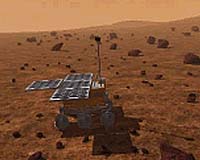 mars-base 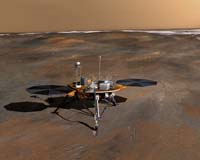 |
| Previous Issues | Aug 18 | Aug 17 | Aug 16 | Aug 15 | Aug 14 |
| The contents herein, unless otherwise known to be public domain, are Copyright 1995-2007 - SpaceDaily. AFP and UPI Wire Stories are copyright Agence France-Presse and United Press International. ESA Portal Reports are copyright European Space Agency. All NASA sourced material is public domain. Additional copyrights may apply in whole or part to other bona fide parties. Advertising does not imply endorsement, agreement or approval of any opinions, statements or information provided by SpaceDaily on any web page published or hosted by SpaceDaily. Privacy statement |